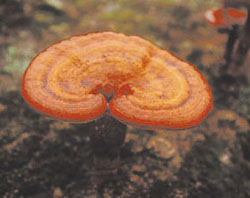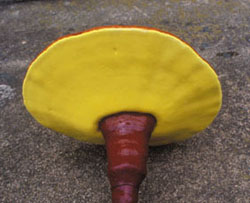
|
|
|
|
|
|
|
March 8, 2014 |
|
|
|||||||||||||||||||||||||
|
In nature, they grow in densely wooded mountains of high humidity and dim lighting. It is rarely found since it flourishes mainly on the dried trunks of dead plum, guercus serrata or pasonia trees. Out of 10,000 such aged trees, only 2 or 3 will have reishi growth, therefore its wild form is generally rare. Also known as Ling zhi meaning "herb of spiritual potency". Reishi has been used for more than 4000 years in Traditional Chinese Medicine . The oldest mushroom known to have been used in medicine and is one of the most respected medicinal mushrooms today. Reishi has now been added to the American Herbal Pharmacopoeia and Therapeutic Compendium. Once rare, this mushroom is now effectively cultivated and is sold in many asian markets. Western health shops often stock extracts of G.Lucidum labelled as Reishi however they are sometimes another type of the same family of mushroom without the full range of medical effects. In traditional Chinese medicine, Reishi is the most highly rated herb in terms of multiple benefit and absence of side effects. It is the only known source of a group of triterpenes known as ganoderic acids, which have a molecular structure similar to steroid hormones. It has the most active polysaccharides (long "chains" of sugars) among medicinal plant sources. Reishi also contains ergosterols, complete proteins, unsaturated fatty acids, vitamins and minerals.
Anti-allergin, antioxidant, analgesic, antifungal, anti-inflammatory, antitumor, antiviral, antiparasitic, cardiovascular, antidiabetic, immunomodulating, hepatoprotective, hypotensive and hypertensive, kidney and nerve tonic, sexual potentiator. Inhibits platelett aggregations. Lowers blood pressure, cholesterol and blood sugar. Bronchitis prevention. It should be noted that these properties are not effective to the same degree in every person and one should seek advice from a practicioner of Traditional Chinese Medicine before relying on Reishi to treat any major health problem.
Constituents:
Coumarin Uses: Tonic, immune booster, allergies, blood pressure stabilizer, altitude sickness, chemotherapy support, HIV support, fatigue, high blood pressure, high triglycerides, hepatitis, inhibits platelett aggregations. Ganoderma extract is useful for people leading a hectic life with heavy schedule. The usual dosage to deal with this problem is 2 capsules 3 times daily reducing to 1 capsule 3 times daily for maintenance. The extract is highly effective in improving and in most cases curing Hepatitis A, B and C within a period of 3 months. The recommended dosage is 4 capsules 3 times daily. Patients should be cured within 3 months. Although the experiences in fighting cancer are more inconsistent, the extract has been shown to be effective in regressing tumours. The results depend on the type of cancer and the severity of the condition. It is recommended that it be used in combination with the prescribed therapy. The Ganoderma extract can be highly effective in substantially reducing or eliminating the side effects of radio- and chemotherapies if it is taken preceded, together and after the treatments. It can prevent side effects like hair loss, nausea, vomiting, stomatitis, sore throat, loss of appetite and insomnia. The recommended dosage is 6 capsules 3 times daily as long as required. Numerous studies of Reishi mainly in China, Korea, Japan and the United States show effectiveness of Reishi for a very wide range of diseases and symptoms. But the studies have not given an explanation of how it does so, because none of its presumed and known active components taken alone have produced results as powerful the intake of Reishi itself. Its effectiveness applies to many areas so it is difficult to classify each of them and conduct research in each field. It is perhaps more comprehensible at this time, to explain Reishi's "miraculous powers" from the Traditional Chinese Medicine point of view. In the West, scientists have separated and classified each disease meticulously, and have specialized in each of them to such a degree that it seems today as if each disease is autonomous and standing alone. Oriental Medicine, resulting from knowledge accumulated through 4000 years of human observation, asserts that health can be maintained by sustaining the right balance within the body and that diseases can be cured by restoring this balance through nutrition, including medicinal herbs, exercise and mental peace. In other words, a disease is believed to be the tip of an iceberg, the result of the underlying imbalance of the body which must be restored. The 2000 year old medicinal book "Seng Nong's Herbal Classic", considered today as the oldest book on oriental herbal medicine, classifies 365 species of roots, grass, woods, furs, animals and stones, separates herbal medicines into 3 categories. The first category, called superior, includes herbs effective for multiple diseases and mostly responsible for maintaining and restoring the body balance. They have no unfavorable side effects. The second category, middle, comprises tonics and boosters and their consumption must not be prolonged. The third category, low, must be taken usually in small doses and for specific ailments. Reishi, ranked number one of the superior medicines, and was the most exalted medicine in ancient times. Observations show that Reishi has relatively little side effects and can be consumed in high doses and in parallel with other medications. Its main properties are the cleansing of blood, enhancement of the immune system and the lessening of nervous tension. These properties are conducive to normalizing and balancing the body and as a result cure a multitude of diseases from within. Reishi mushroom is particularly beneficial for individuals with asthma and other respiratory complaints. "It has a healing effect on the lungs", "Reishi is good for respiratory strength and for coughing". At least one population study confirms this claim. When more the 2000 Chinese with chronic bronchitis took reishi syrup during the 1970s, within two weeks, 60 to 90% felt better and reported an improved appetite, according to "Medicinal mushrooms," by Christopher Hobbs, published in Herbs for Health, Jan/Feb 97. Serving Lingzhi should follow the concept of Chinese food treatment: "No dizzy, no recovery". At the beginning, some people may feel dizzy, pelvic fatigue, itching, thirsty, or even the increase of defaecation and urination. However, these reactions demonstrate the effectiveness of Lingzhi to the body. The toxins are dissolved, mobilized, and excreted. Therefore, these reactions are normal. Reishi has attained an unparalleled reputation in the Orient as the ultimate herbal substance. It is said that for thousands of years it was the most sought-after herb by mountain sages, Emperors and Empresses of Eastern nations.
This article is licensed under the GNU Free Documentation License. It uses material from the Wikipedia article "Reishi".
|
||||||||||||||||||||||||
|
|
|
||
|
All informatin on the site is © FamousChinese.com 2002-2005. Last revised: January 2, 2004 Are you interested in our site or/and want to use our information? please read how to contact us and our copyrights. To post your business in our web site? please click here. To send any comments to us, please use the Feedback. To let us provide you with high quality information, you can help us by making a more or less donation: |

